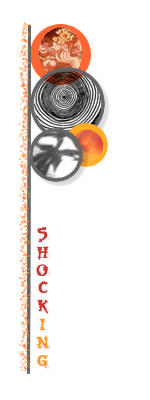 |
POWER
and
'REALITY' |
Through Jackson's extensive
use of 'perverted' vision in The Melancholy of Anatomy,
she takes body parts and explodes the socially ingrained texts
that go along with them. When the conventional becomes wild,
and the wild conventional--both seem to fall flat as visions
of 'reality.' Indeed, language, body and text all seem to
become fictional scripts that regulate power between people.
|
GAPS
IN THE
SCRIPT
|
The literal fragmentation of the body may
be the primary site anxiety of King Lear, but it
is also a source of power. Body parts resonate with sexual
tension, but can also misrepresent the whole when they are
ventriloquized by another or do not perform as expected. When
the body is fragmented and is expected to perform metonymically,
strange and monstrous scripts can flourish. The process begins
and ends with Cordelia’s mouth. In "The Absent
Mother in King Lear," Coppelia Kahn convincingly argues
that "The play is full of oral rage: it abounds in fantasies
of biting and devouring, and more specifically, fantasies
of parents eating children and children eating parents...When
Cordelia doesn't feed [Lear] with love, he thinks angrily
of eating her" ( 302).
In a troubling gesture, Lear calls for Cordelia to pledge
all of her love to him before she is to be married—Cordelia
instead chooses division. Her refusal to speak for Lear opens
the wound in the text out of which monsters will pour: “Nothing,
my lord. /Nothing? /Nothing. /Nothing will come of nothing,
speak again.” ( 1.1.87-90).
She refuses to stage her love, calling forth a grotesque vision
by claiming that she “cannot heave /My heart into my
mouth” ( 1.1.91-2).
----
|
A
GOOD DAUGHTER
|
"Sometimes I think that a good daughter
would let her father bite her thumbs off, or at least would
not hesitate to perform the sinus-draining boon he craves
(possibly wearing a protective thumb-guard such as one might
devise from a piece of sheet metal and some wire, or maybe
shoving a block of wood between the jaws, as wise heroines
do in the case of dragons), but then I think, what is this
self-defeating shit?" ( MA
104).
----
|
|
Mouths continue to figure (alarmingly separate from the
rest of the body in description) throughout the text of King
Lear, partly due to the connection between mouths and
vaginas, silence and sexual control. But reading the mouth
for metaphorical significance is troubling--it is a shifty
organ at best: "such homologies might lead to uncomfortable
morphologies: if, as Bulwer writes, the tongue is in some
sense virile (meaning both manly and hard), it is also often
imagined as its opposite, mulier (meaning both womanly and
soft). The fact that one of the first early modern medical
descriptions of the clitoris not only imagined it 'as part
of woman's 'shameful member'...but as 'a little tongue' (languette),
problematizes the gendering of the tongue (or speech itself)
as 'phallic'" (Mazzio 60).
During the first act of the play, Cordelia’s focus upon
the mouth and the eye mirrors the mapped out divisions of
the state—both carry deep anxieties over accurate and
stable representations. While Cordelia’s own tongue
refuses public representation because her love cannot be translated
into language, she is able to see the contrasting nature of
her sisters commercially appealing bodies: Goneril and Regan
wield “A still-soliciting eye, and such a tongue /As
I am glad I have not” (1.1.233)
while “my love’s /More ponderous than my tongue”
(1.1.78). As the name ‘King’
is stripped of its significance, Lear finds that daughter
Regan “struck me with her tongue” (2.4.157)
and he begins to understand the danger of calling women to
speak. Edgar also reiterates the dangers of mingling male
body parts with fiendish females: “Keep thy foot out
of brothels, thy hand out of plackets, thy pen from lender’s
books, and defy the foul fiend” (3.4.93-5).
|
| |
|
|
|
